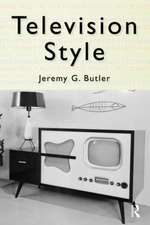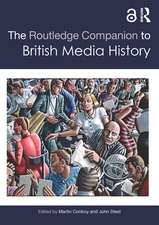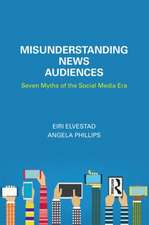Television: Visual Storytelling and Screen Culture
Autor Jeremy G. Butleren Limba Engleză Paperback – 26 feb 2018
Highlights of the fifth edition include:
- An entirely new chapter by Amanda D. Lotz on television in the contemporary digital media environment.
- Discussions integrated throughout on the latest developments in screen culture during the on-demand era—including the impact of binge-watching and the proliferation of screens (smartphones, tablets, computer monitors, etc.).
- Updates on the effects of new digital technologies on TV style.
| Toate formatele și edițiile | Preț | Express |
|---|---|---|
| Paperback (1) | 533.58 lei 3-5 săpt. | +36.91 lei 5-11 zile |
| Taylor & Francis – 26 feb 2018 | 533.58 lei 3-5 săpt. | +36.91 lei 5-11 zile |
| Hardback (1) | 792.93 lei 6-8 săpt. | |
| Taylor & Francis – 26 feb 2018 | 792.93 lei 6-8 săpt. |
Preț: 533.58 lei
Preț vechi: 579.98 lei
-8% Nou
Puncte Express: 800
Preț estimativ în valută:
102.11€ • 106.21$ • 84.30£
102.11€ • 106.21$ • 84.30£
Carte disponibilă
Livrare economică 24 martie-07 aprilie
Livrare express 08-14 martie pentru 46.90 lei
Preluare comenzi: 021 569.72.76
Specificații
ISBN-13: 9781138743960
ISBN-10: 1138743968
Pagini: 422
Ilustrații: 12 Tables, black and white; 300 Halftones, black and white
Dimensiuni: 178 x 254 x 18 mm
Greutate: 0.91 kg
Ediția:5 ed
Editura: Taylor & Francis
Colecția Routledge
Locul publicării:Oxford, United Kingdom
ISBN-10: 1138743968
Pagini: 422
Ilustrații: 12 Tables, black and white; 300 Halftones, black and white
Dimensiuni: 178 x 254 x 18 mm
Greutate: 0.91 kg
Ediția:5 ed
Editura: Taylor & Francis
Colecția Routledge
Locul publicării:Oxford, United Kingdom
Public țintă
UndergraduateCuprins
PART I TELEVISION STRUCTURES AND SYSTEMS
1. Television Structures and Systems: Ebb and Flow in the Network Era
2. Television Structures and Systems: Ebb and Flow in the Postnetwork Era - Amanda Lotz
3. Narrative Structure: Television Stories
4. Building Narrative: Character, Actor, Star
5. Beyond and Beside Narrative Structure
6. The Television Commercial
PART II TELEVISION STYLE: IMAGE AND SOUND
7. An Introduction to Television Style: Modes of Production
8. Style and Setting: Mise-en-Scene
9. Style and the Camera: Videography and Cinematography
10. Style and Editing
11. Style and Sound
PART III TELEVISION STUDIES
12. An Introduction to Television Studies
13. Textual Analysis
14. Discourse and Identity
1. Television Structures and Systems: Ebb and Flow in the Network Era
2. Television Structures and Systems: Ebb and Flow in the Postnetwork Era - Amanda Lotz
3. Narrative Structure: Television Stories
4. Building Narrative: Character, Actor, Star
5. Beyond and Beside Narrative Structure
6. The Television Commercial
PART II TELEVISION STYLE: IMAGE AND SOUND
7. An Introduction to Television Style: Modes of Production
8. Style and Setting: Mise-en-Scene
9. Style and the Camera: Videography and Cinematography
10. Style and Editing
11. Style and Sound
PART III TELEVISION STUDIES
12. An Introduction to Television Studies
13. Textual Analysis
14. Discourse and Identity
Notă biografică
Jeremy G. Butler is Professor of Journalism and Creative Media at the University of Alabama. He has taught television, film, and new media courses since 1980 and is active in online educational resources for television and film studies.
Recenzii
"In recent years, TV has radically changed and, simultaneously, tapped into genres and technical formulas pioneered decades ago. Butler’s magisterial book—including a terrific new chapter by Amanda Lotz—enables us to make sense of it all. There is, quite simply, no more comprehensive resource for the student of television." -Heather Hendershot, Massachusetts Institute of Technology
"Instructors of undergraduate television studies courses know that Butler’s Television is a smart, accessible, and indispensable teaching tool, whether our objects of study are The Beverly Hillbillies or Breaking Bad, Monday Night Football or Meet the Press. This exciting new edition incorporates up-to-date critical perspectives on the latest developments in a medium that keeps expanding across multiple modes of delivery, ways of watching, and forms of communication." -Mary Desjardins, Dartmouth College
"Given television’s pervasive presence in our personal and political lives today, it’s vital to understand how TV works as an expressive form, a business, and a cultural force. Jeremy Butler’s updated Television proves more indispensable than ever before in exploring these facets of the medium." -Christine Becker, University of Notre Dame
"Television remains the best book out there for introducing students to the art, industry, and culture of television as we actually experience it. An essential guide to the stories television tells, yesterday and today." -Michele Hilmes, University of Wisconsin, Madison
"Instructors of undergraduate television studies courses know that Butler’s Television is a smart, accessible, and indispensable teaching tool, whether our objects of study are The Beverly Hillbillies or Breaking Bad, Monday Night Football or Meet the Press. This exciting new edition incorporates up-to-date critical perspectives on the latest developments in a medium that keeps expanding across multiple modes of delivery, ways of watching, and forms of communication." -Mary Desjardins, Dartmouth College
"Given television’s pervasive presence in our personal and political lives today, it’s vital to understand how TV works as an expressive form, a business, and a cultural force. Jeremy Butler’s updated Television proves more indispensable than ever before in exploring these facets of the medium." -Christine Becker, University of Notre Dame
"Television remains the best book out there for introducing students to the art, industry, and culture of television as we actually experience it. An essential guide to the stories television tells, yesterday and today." -Michele Hilmes, University of Wisconsin, Madison
Descriere
With discussions integrated throughout on the latest developments in television's on-going convergence with other media, this revised fifth edition provides students with a whole toolbox of implements to disassemble television and read between the lines, teaching them to incorporate critical thinking into their own television viewing.



